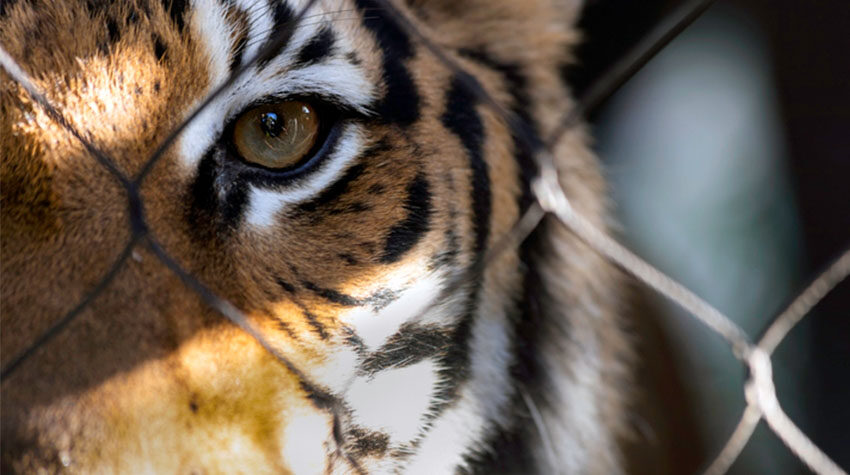
April 10, 2023Animal Law & Policy Clinic, BlogClinic Submits Public Comments to USDA on Animal Handling, Enrichment, and Personnel Training
By Hallie Aylesworth, Elizabeth Duncan, and Andrew Slottje
Today, Harvard Law School’s Animal Law & Policy Clinic submitted comprehensive public comments to the U.S. Department of Agriculture (USDA)’s Animal & Plant Health Inspection Service in response to its Advance Notice of Proposed Rulemaking (ANPR) on “Wild and Exotic Animal Handling, Training of Personnel Involved with Public Handling of Wild and Exotic Animals, and Environmental Enrichment for Species.” The ANPR was published in the Federal Register on January 9, 2023. In the comments, the Clinic urges the USDA to ban public contact with captive wild animals, impose heightened training requirements for all personnel that handle wild and exotic animals, and require enrichment (a species-appropriate physical and social environment that promotes animals’ psychological and physical well-being) for all regulated species.
Students Hallie Aylesworth, Elizabeth Duncan, and Andrew Slottje drafted the 60-page comments under the supervision of Clinical Instructor Rachel Mathews. The Clinic’s comments recognize that improvements to animal handling, training, and enrichment are long overdue and desperately needed to carry out the fundamental purpose of the Animal Welfare Act – to “insure the humane treatment” of animals used in research, exhibits, and the pet trade. However, the Clinic warns that the approaches contemplated by the USDA as explained in the ANPR fall far short of what is required to protect and promote animal welfare in accordance with the USDA’s mandates under the Animal Welfare Act (AWA) and the Endangered Species Act (ESA).
The AWA is a federal law meant to ensure humane care and treatment for covered animals. To this end, the USDA must promulgate requirements governing the humane handling, care, treatment, and transportation of covered animals by animal exhibitors, dealers, research facilities, and other businesses. Yet for decades the USDA’s lax standards have failed to meaningfully protect animal welfare. They have authorized animals to be subjected to stressful and dangerous practices like public contact and performances, and have allowed animals of most species to be kept in small, barren, and isolated enclosures, causing severe psychological and physical harm.
The ESA additionally imposes an affirmative duty upon the USDA to further the conservation of endangered and threatened species—many of whom are held captive by roadside zoos and other exhibitors. Public contact and inadequate enrichment harass, harm, injure, and even kill protected species in violation of the ESA. The Clinic’s comments explain that at an absolute minimum, this requires the USDA to prohibit all public contact with, and require enrichment for, all species listed under the ESA.
As the Clinic’s comments explain, the USDA’s ANPR falls short of fulfilling the mandates of these statutes. First, it proposes to categorize animals as suitable for public contact based on the perceived threat to humans, rather than on the harmful impacts public handling has on the animals. No form of public contact is designed to benefit animals; it is done for human entertainment and profit. The Clinic’s comments explain that public contact is stressful for animals and puts both animals and humans at risk of injury and disease. For these reasons, no form of public contact with wild and exotic animals should be permitted.
Second, while the ANPR crucially proposes requiring all captive animals covered by the AWA to receive enrichment—a change with which the Clinic strongly agrees — the “performance standards” approach proposed in the ANPR will be vague, lax, and difficult to enforce. In its comments, the Clinic urges the USDA to promulgate specific and concrete enrichment standards that require each animal to receive meaningful habitat, object, food, and social enrichment. The Clinic also argues that the USDA must require enrichment plans to be submitted to the USDA for approval and to be reviewed at each inspection to ensure compliance. “A rich physical and social environment is essential to a captive animal’s wellbeing,” Duncan explained. “We urge the USDA to adopt meaningful and enforceable enrichment standards for all regulated species.”
Finally, the comments explain that staff training and occupational safety standards are necessary to protect the health and safety of animals and humans, and suggest ways to accomplish these objectives.
“By submitting these comments, we hope to remind the USDA that the AWA exists to further the health and welfare of animals. Animal welfare must be the focus of this rulemaking, and animals do not benefit from hands-on public encounters,” explained Aylesworth.
Because the Clinic’s comments are in response to an Advance Notice of Proposed Rulemaking, the Clinic will have further opportunity to comment once the USDA releases the text of a Proposed Rule.
